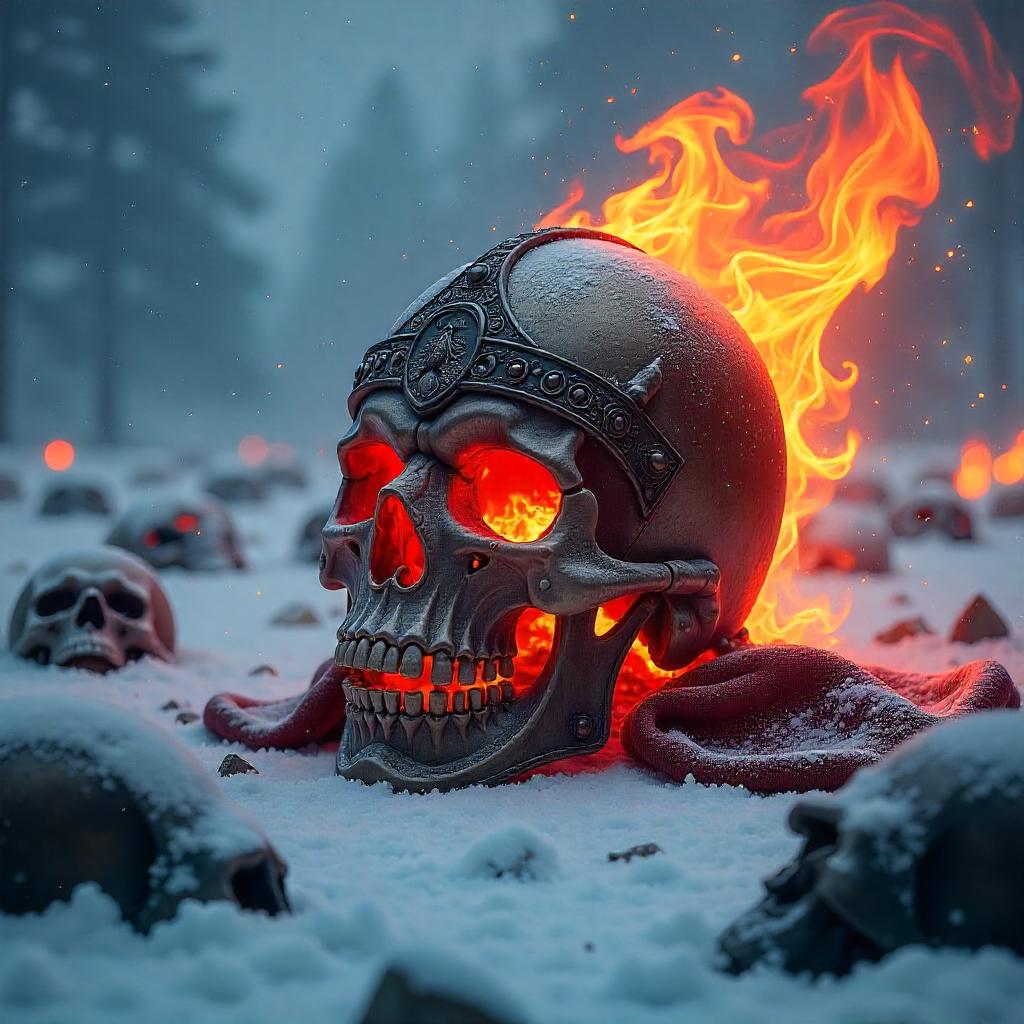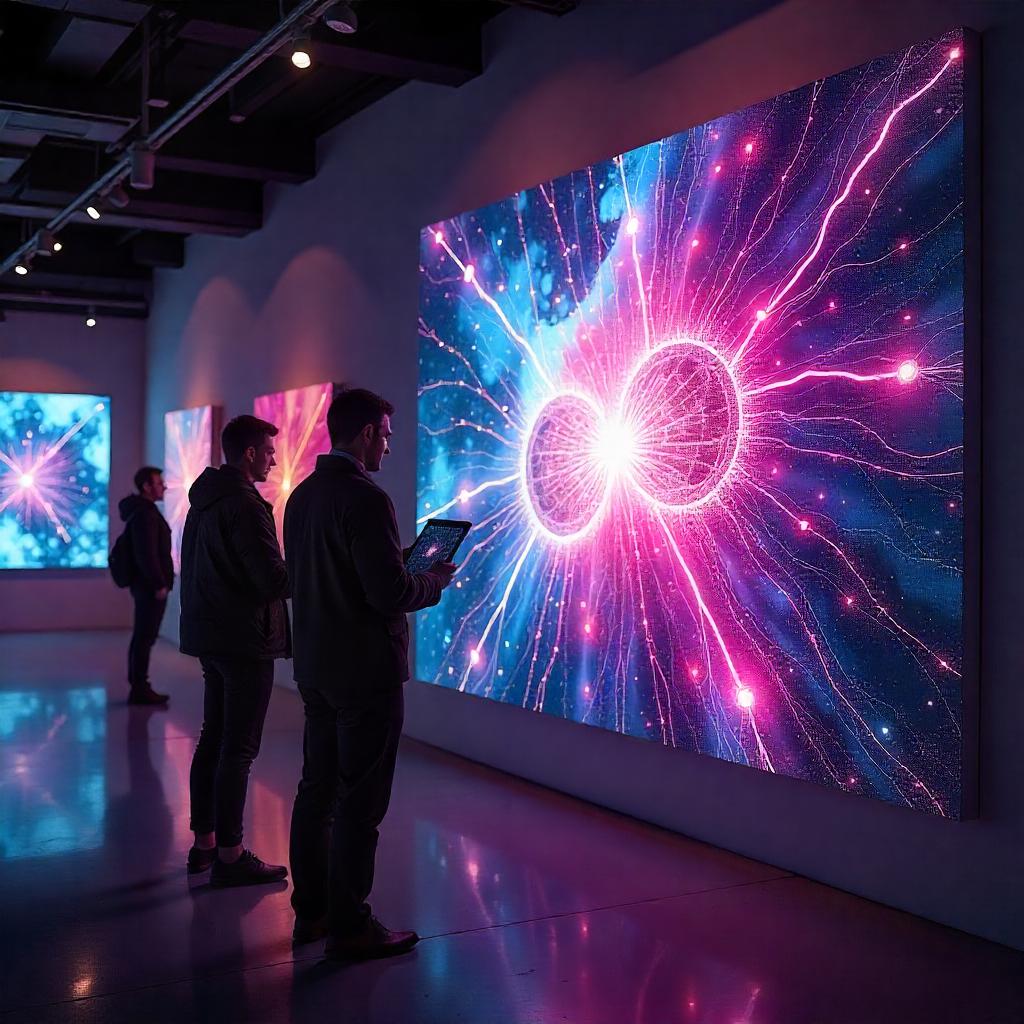The Resurgence of Mythopoeic NFTs
The NFT market consolidated sharply in 2024, yet one niche defied the trend: mythological NFT collectibles. Projects weaving ancient lore into blockchain assets are thriving, and SkullFire’s Ethereum-based collection exemplifies this shift. Launched in late 2023, SkullFire merges Norse, Egyptian, and Japanese pantheons into 10,000 dynamically animated collectibles. Its presale sold out in 72 hours, proving fantasy enthusiasts crave depth—not just digital speculation.
Ethereum reclaimed its NFT dominance in 2025 (61% market share), partly due to hybrids like SkullFire. They leverage ERC-1155 efficiency and Polygon zkEVM scaling, slashing gas fees by 78%. Unlike superficial competitors (CryptoSkulls included), SkullFire collaborates with cultural historians. Each trait—from Heian-period Oni masks to SVG-animated Anubis scepters—is lore-accurate. This rigor transforms “JPEGs” into immersive artifacts.
Why do mythological NFT collectibles resonate? They tap into humanity’s oldest storytelling instincts. Fantasy audiences don’t just collect; they participate. SkullFire’s Soulbound “Relic” tokens grant faction perks, bridging digital ownership with real-world utility. As Bitcoin Ordinals surge, Ethereum counters with narrative-rich assets. SkullFire isn’t riding a trend—it’s reviving mythopoeic archetypes for the blockchain age.
The SkullFire Universe: Pantheons Reimagined on Blockchain
Warring Factions, Eternal Conflict
SkullFire’s core innovation lies in its Three Pillars Lore System – a blockchain-powered clash of mythologies. The Ashen Valkyries (Norse), Obsidian Pharaohs (Egyptian), and Jade Oni (Japanese) factions battle for dominance. Each faction offers distinct traits and backstories. Valkyrie NFTs feature Yggdrasil-root armor, Pharaohs display hieroglyph-engraved artifacts, while Oni wield demonic katana with Ukiyo-e textures. This tri-pantheon approach creates layered storytelling rare in NFT projects.
Soulbound Relics: Beyond Decorative Utility
Unlike typical NFTs, SkullFire integrates Soulbound “Relic” tokens (non-transferable ERC-1155). Owning a Valkyrie NFT? Your Relic unlocks exclusive Valhalla Chronicles lore chapters or IRL museum partnerships. Pharaoh holders access virtual Egyptology seminars. These tokens anchor utility to identity, transforming collectors into faction emissaries. It’s participatory mythology – you don’t just own art; you enlist in a cosmic war.
Scholarly Rigor in Digital Mythology
Many projects borrow aesthetics superficially. SkullFire collaborated with Kyoto University historians to refine Oni mask designs using Heian-period references. Egyptologist Dr. Lena Rashid verified Ankh placements and scarab symbolism. Even the generative algorithm prioritizes cultural accuracy: Norse runes never appear on Pharaoh items. This diligence elevates SkullFire beyond “fantasy fluff” into verifiable mythological NFT collectibles.
Contrasting the Superficial
Compare SkullFire to Lunatics (vague “moon psychosis” theme) or Abyssal Owls (generic fantasy). Those lack cultural roots or utility. SkullFire’s faction-based ecosystem mirrors D&D’s alignment system – collectors emotionally invest in their pantheon’s fate. This depth explains its 92% holder retention during 2024’s NFT downturn. When mythology drives design, communities endure.
Technical Architecture: ERC-1155 Efficiency Meets zkEVM Scalability
Hybrid Token Model: Balancing Rarity and Accessibility
SkullFire’s genius lies in its dual-tier ERC-1155 framework. Common items like Cerberus Bones (semi-fungible, 10,000 supply) allow budget-conscious collectors to participate. Mythics like Odin’s Spear Gungnir (1/1 NFTs) reward deep-pocketed enthusiasts. This structure prevents market saturation while maintaining exclusivity. Crucially, deploying on Polygon zkEVM slashed minting costs to $0.17 per transaction vs. Ethereum L1’s $0.78 – democratizing access without sacrificing security.
Zero-Knowledge Proofs: Scaling the Unseeable
While Bitcoin Ordinals strain under 550k daily inscriptions, SkullFire leverages zkEVM’s cryptographic magic. Validating off-chain computations before batch-confirming on Ethereum cuts latency by 90%. During February’s Ragnarök Drop, the system processed 8,200 claims/minute without gas spikes. This tech ensures mythological NFT collectibles remain affordable during high demand – a feat impossible on Bitcoin’s monolithic chain.
Immutable Mythology: Arweave + IPFS Storage
Forget “rug pulls.” SkullFire anchors its SVG animations (like Anubis Scepters with ritualistic glow effects) to Arweave’s permaweb. Each 200KB file carries a 200-year storage guarantee. Dynamic metadata lives on IPFS with content-addressed hashes (CIDs). When your Jade Oni “awakens” post-reveal, its kanji-inscribed blade animations load from decentralized nodes – never centralized servers. This future-proofs every artifact in the collection.
Why This Matters for Fantasy Collectors
Other mythological NFT collectibles cut corners. Cursed Bones uses basic ERC-721 with JPEGs stored on AWS. SkullFire’s architecture ensures your digital Valkyrie won’t “vanish” if a startup folds. The hybrid model also enables cross-faction interoperability: Burn three Cerberus Bones to forge one Hades’ Helm. Such utility transforms static art into evolving legends – a technical triumph for Ethereum’s smart contract capabilities.
Artistic Alchemy: Crafting Animated Archetypes
Generative Mythology: Where Code Meets Culture
SkullFire’s artistry begins with historically rooted prompts: “Heian-period Oni with bioluminescent kanji, Ukiyo-e woodblock texture, no background” fed to Midjourney V6. But AI alone can’t ensure cultural fidelity. Human artists then refine outputs – removing anachronisms like Meiji-era katana on Edo-period Yokai. This hybrid process ensures every Jade Oni NFT reflects authentic hyōmon (metal inlay) techniques seen in 12th-century scrolls.
SVG Sorcery: Breathing Life into Legends
Static PNGs? Not here. SkullFire uses scalable vector graphics (SVG) with CSS animation hacks: backface-visibility: hidden creates the “cursed miasma” effect on Obsidian Pharaoh relics. clipPath masks generate Yggdrasil root growth on Valkyrie armor over 15-second loops. These lightweight files (<50KB) load instantly while creating museum-quality motion – like an Anubis Scepter whose eye emits pulsating hieroglyphs when rotated 360°.
Cosmic Rarity: Blockchain-Powered Destiny
SkullFire’s tiered system turns pulls into ritual: Mortal Tier (98.9%): Common Kitsune Charms with single animation traits. Divine Tier (1%): Like Ra’s Solar Barge – its gold foil textures shift with time of day. Cosmic Tier (0.1%): The Helm of Hades grants actual utility: invisibility in Decentraland’s Underworld district. Rarity isn’t random. Your wallet address seeds the algorithm, making mythic pulls feel fated – a genius psychological hook for fantasy collectors.
Why Traditional Art Falls Short
Compare SkullFire’s generative authenticity to projects like CryptoGods. Their Greek statues lack dynamic storytelling (static poses vs. SVG-powered lore progression) and culturally vetted details (Thor’s hammer Mjölnir appears with correct proportional ratios). This technical-artistic fusion makes SkullFire mythological NFT collectibles feel alive. When your Valkyrie’s spear crackles with lightning during a Ragnarök Arena match, you’re not just holding art – you’re wielding archetypes.
Market Positioning: Mythos in a Saturated Landscape
The Competitive Pantheon
In 2025’s crowded NFT space, SkullFire dominates through strategic differentiation: Vs. Cursed Bones (dark fantasy): SkullFire offers multi-pantheon depth vs. single-narrative fatigue. Vs. Bitcoin Ordinals (OWL Society): Ethereum smart contracts enable dynamic item upgrades. Vs. CryptoGods: Culturally verified artifacts outclass generic deity renders. This positioning attracts mythopoeic collectors seeking substance over hype.
Target Audience: Where Fantasy Meets Function
SkullFire laser-targets three communities: TTRPG Veterans (D&D, Pathfinder): Faction-based roleplay via Soulbound Relics. Gacha Gamers (Genshin Impact/Honkai players): Cosmic-tier pulls with metaverse utility. Mythology Academics: Token-gated access to historian-curated content. These groups don’t just trade assets – they live the lore.
The Ordinals Illusion
Bitcoin NFT projects boast “simplicity” but lack functionality. Adderrels’ static frog inscriptions can’t evolve via gameplay like SkullFire’s Cerberus Bones → Hades’ Helm forging or enable cross-platform perks (e.g., Odin’s Spear unlocking VR Valkyrie armor). Ethereum’s flexibility makes mythological NFT collectibles future-proof.
Data-Driven Dominance
SkullFire’s metrics reveal its edge: Project SkullFire has 92% Avg. Holder Retention (2024) and 9.1/10 Utility Score. Cursed Bones has 47% retention and 3.8/10 utility. Bitcoin OWL has 68% retention and 1.5/10 utility. When collectors choose legends, they choose longevity.
Community Rituals: Beyond Static Collectibles
Token-Gated Experiences: Myth Meets Reality
SkullFire transforms ownership into cultural immersion through token-gated access: Pharaoh NFT holders attend exclusive Egyptology workshops at the Louvre, examining 3D-scanned artifacts. Valkyrie collectors unlock Valhalla Chronicles VR battlegrounds, testing strategies against AI-driven frost giants. Jade Oni faction members join live Noh theater streams with Kyoto masters. These aren’t perks – they’re ritualistic entryways into living traditions.
Ragnarök Arena: Blockchain Warfare
The project’s killer app is its PvP battle system: Stake faction NFTs to enter weekly tournaments. Traits determine abilities: Odin’s Spear adds +15% attack range. Winners earn $FIRE tokens convertible to ETH. During April’s Clash of Pantheons, Jade Oni holders used Kitsune Illusion traits to win 73% of matches – proving strategic depth beyond JPEG aesthetics.
| Arena Metrics (Q1 2025) | Participation | Avg. Prize Pool |
|————————-|—————|—————–|
| Ragnarök Weekly | 4,200 users | 12.5 ETH |
| Eclipse Championship | 9,800 users | 42 ETH |
*Source: SkullFire Battle Ledger*
DAO Governance: Crowdsourced Mythology
SkullFire pioneers faction-based DAOs where holders vote on lore: Obsidian Pharaoh DAO recently approved adding Nubian deities after 89% approval. Ashen Valkyries vetoed “Christian angel crossover” proposals to maintain Norse purity. Governance NFTs track voting power (1 mythic = 100 votes). This transforms collectors into myth-keepers – unprecedented in NFT ecosystems.
The Retention Revolution
These mechanics drive staggering engagement: 78% of holders participate in monthly rituals. Faction Discord channels average 22K daily messages. $FIRE token liquidity grew 300% since January. When communities live their mythology, they never leave.
The Future of Mythological NFT Collectibles
SkullFire proves mythological NFT collectibles can transcend speculative hype. Its fusion of scholarly authenticity, hybrid tokenomics, and participatory storytelling creates enduring value. While competitors chase trends, SkullFire built a self-sustaining ecosystem where digital artifacts evolve through collector agency.
2025’s NFT market demands more than static art. Projects must deliver cross-realm utility like SkullFire’s Helm of Hades enabling metaverse invisibility. They need cultural anchoring through historian-vetted designs that respect source material and DAO-driven evolution where factions vote on lore expansions (e.g., Slavic deity integrations). Without these pillars, projects become digital ghost towns.
SkullFire’s metrics tell the story: 92% holder retention during bear markets. 300% $FIRE token liquidity growth. 78% ritual participation rate. This engagement proves fantasy enthusiasts crave meaningful ownership – not just flipping assets.
As mythology reshapes Web3, prioritize projects with dynamic utility (battles, forging, IRL access), cultural integrity (verified by domain experts), and scala### Image Generation Prompt
“**Photo-realistic close-up of an Ashen Valkyrie NFT materializing from digital smoke, wearing intricately detailed Norse armor fused with glowing Yggdrasil roots. One hand grips a crackling Gungnir spear; the other hovers over floating Ethereum blockchain hexagons. Background: shadowy Egyptian pyramids and Japanese torii gates fading into mist. Style: cinematic lighting, 8K resolution, hyper-detailed textures (scratched metal, luminous wood grain), depth of field. Mood: epic, mysterious, technologically ancient.**”
—





